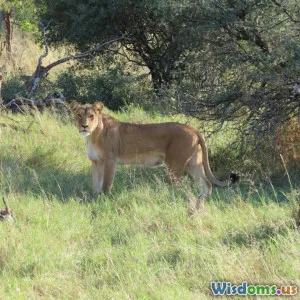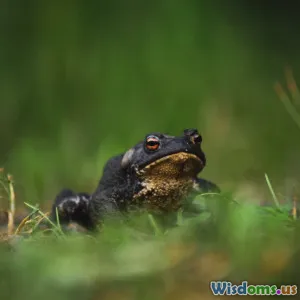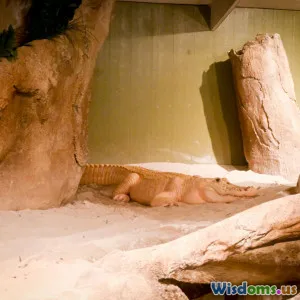
The Importance of Biodiversity
8 min read Explore the vital role biodiversity plays in sustaining ecosystems and human life within the animal kingdom. (0 Reviews)
The Importance of Biodiversity
Introduction
Imagine a world where the songs of birds no longer echo through forests, where vibrant coral reefs fade into grey, and the intricate web of life falters. This bleak scenario underscores a critical reality: biodiversity—the immense variety of life on Earth—is not just an artistic flourish of nature but a cornerstone of survival for all organisms, including humans. Often taken for granted, biodiversity is a complex and dynamic feature of animal biology and ecology that ensures ecosystem resilience, stability, and adaptability.
In this article, we will explore the multifaceted importance of biodiversity, focusing on its role within the animal kingdom and biological systems. We will delve into its benefits, threats it faces, and why its preservation is essential for sustaining life on our planet.
What is Biodiversity?
Biodiversity encompasses the diversity of all living organisms—genes, species, and ecosystems. Within the animal kingdom, this ranges from microscopic invertebrates to the largest mammals and birds. It includes the variations within each species, between species, and within entire habitats.
According to the United Nations Environment Programme (UNEP), over 8.7 million species are believed to inhabit Earth, most yet to be discovered. This immense diversity underpins the complexity and vitality of ecosystems worldwide.
The Ecological Role of Biodiversity in the Animal Kingdom
1. Ecosystem Stability and Resilience
Biodiversity ensures ecosystems can withstand disturbances such as natural disasters or human impacts. Diverse animal species contribute different ecological functions — nutrient recycling, pollination, predation, and habitat creation.
For example, wolves in Yellowstone National Park regulate prey populations, promoting vegetation growth and improving riverbank stability, an event known as a trophic cascade. This shows how loss of a single species can ripple through the ecosystem, disrupting balance.
2. Genetic Diversity Helps Species Adapt
Within-animal species genetic variation enables populations to adapt to environmental changes like climate shifts or diseases. Consider the Tasmanian devil, battling a contagious cancer; populations with higher genetic diversity increase chances of resistance and survival.
3. Supporting Food Webs and Nutrient Cycles
The animal kingdom drives complex interactions that maintain nutrient cycling and energy flow. For instance, decomposers like insects help break down organic matter, returning nutrients to the soil. Predators control herbivore numbers, preventing overgrazing and maintaining plant diversity.
Benefits of Biodiversity to Human Society
Ecological Services
Beyond animal biology, biodiversity offers countless services crucial for humans:
-
Pollination: Apart from bees, diverse animals like birds and bats contribute to the pollination of crops, representing a billion-dollar service vital for food security.
-
Medicinal Resources: Approximately 50% of pharmaceutical drugs originate from natural products, many discovered through studying animals and their ecosystems.
-
Climate Regulation: Diverse habitats such as mangroves and wetlands sequester carbon, mitigating the effects of global warming.
Cultural and Economic Importance
Indigenous cultures worldwide derive spiritual significance and livelihoods from biodiversity-rich environments. Tourism, often centered around unique animal species and habitats, generates billions annually, underscoring the economic value of conserving biodiversity.
Threats to Biodiversity in the Animal Kingdom
Habitat Loss and Fragmentation
Expansion of agriculture, urbanization, and deforestation alarmingly reduce animal habitats. As an example, tropical rainforests, which harbor over half the world’s terrestrial species, continue to decline at unsustainable rates.
Climate Change
Rapid alterations in temperature and weather patterns affect migration, breeding, and food availability. Coral bleaching events demonstrate the devastating effects of rising sea temperatures on marine biodiversity.
Pollution and Invasive Species
Chemical pollutants disrupt animal health and reproduction, while invasive species introduced by human activity compete with native fauna, altering ecosystem dynamics. The Burmese python invasion in the Florida Everglades has destabilized local native species populations.
Conservation Efforts: Preserving Biodiversity
Protected Areas and Wildlife Corridors
Designating national parks, reserves, and connecting habitats via wildlife corridors sustains ecological connectivity and genetic exchange.
Sustainable Practices
Incorporating sustainable agriculture, forestry, and fishing protects habitats and reduces pressure on species. The certification of sustainable palm oil production illustrates this in practice.
Community Involvement and Education
Empowering indigenous peoples and communities to be stewards of biodiversity has proven effective worldwide. Education fosters awareness and inspires action, as evidenced by global initiatives like Earth Day and the Convention on Biological Diversity.
Technological and Scientific Advances
Genetic monitoring, satellite tracking, and environmental DNA techniques enable better understanding and management of biodiversity.
Conclusion
The importance of biodiversity, especially within the animal kingdom, extends far beyond aesthetic or philosophical appreciation; it is a foundation upon which ecosystems and human civilizations thrive. The interdependent roles animals play—from genetic stock to ecosystem engineers—underscore how essential it is to sustain the planet’s natural heritage.
Loss of biodiversity signals not just the disappearance of beautiful creatures but jeopardizes ecosystem services crucial for life support, including our own. As we deepen our understanding of biology and ecology, the imperative is clear: protecting biodiversity must be central to global efforts for sustainability. In doing so, we safeguard not only wildlife but ultimately ensure a resilient and vibrant future for mankind on Earth.
References
- United Nations Environment Programme, 2020. Global Biodiversity Outlook 5.
- Ripple, W.J., et al. (2014). "Status and Ecological Effects of the World’s Largest Carnivores". Science.
- Cardinale, B.J., et al. (2012). “Biodiversity loss and its impact on humanity.” Nature.
- Conservation International, 2023. The Importance of Biodiversity.
- WWF Living Planet Report, 2022.
Rate the Post
User Reviews
Popular Posts




















